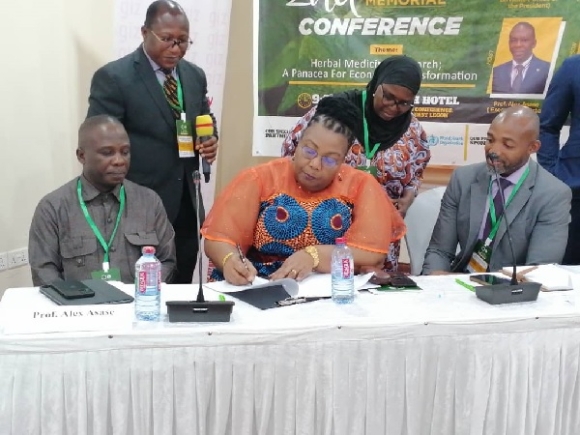THE Centre for Plant Medicine Research (CPMR) has signed a Memorandum of Understanding (MoU) with Export Barbados and the University of West Indies to boost Ghana’s export of plant-based medicines for economic growth.
Under the agreement, the Centre will cultivate in Ghana, already thriving medicinal plants in Barbados and preserve the same for the country.
This is to enable Ghana to assist Barbados in recovering these plants in the event of any threats in Barbados.
Export Barbados will also ensure that Ghanaian herbal medicines reach the Caribbeans.
The Financial Attache of the Barbados High Commission, Rosalind Luke-Harrison, signed on behalf of Barbados while the Dean of Faculty of Medical Sciences, Damian Cohall, PhD, signed on behalf of the University of the West Indies, Cave Hill of Barbados with the Executive Director at CPMR, Prof. Alex Asase on the other hand initialling on behalf of the Centre.
Prof. Asase explained that the Centre has started piloting with the first batch of one of its products, URO 500, being transferred to Barbados for market survey purposes.
Conference
The MoU was signed as part of the 2nd Oku Ampofo Memorial Conference last Wednesday in Accra on the theme: “Herbal Medicine Research- A Panacea for Economic Transformation.”
The three-day conference brought together industry, policy makers, scientists, academia and pharmacists to deliberate on the importance of herbal medicine on economic transformation.
It was also to celebrate the remarkable achievement by the Centre for Plant Medicine Research and the Ghana Federation of Traditional Medicine Practitioners Association (GHAFTRAM).
Stimulating economic growth
Speaking at the event, the Presidential Advisor on Health, Dr Anthony Nsiah Asare, who was the keynote speaker at the event, said natural products can be valuable export commodities, contributing to the country’s balance of trade.
He expressed the government's readiness to partner herbal institutions to develop the sector with appropriate policies adding that “developing and promoting natural products exports can stimulate the economy.”
“It is more imperative for Ghana to develop the sector now that Ghana is in the process of becoming a vaccine and other serum manufacturing hub in the sub-region for vaccine sufficiency.
“The passage of the Narcotics Control Commission Amendment Bill into law, allowing the cultivation of cannabis for industrial and medicinal use is very apt,” Dr Asare said.
